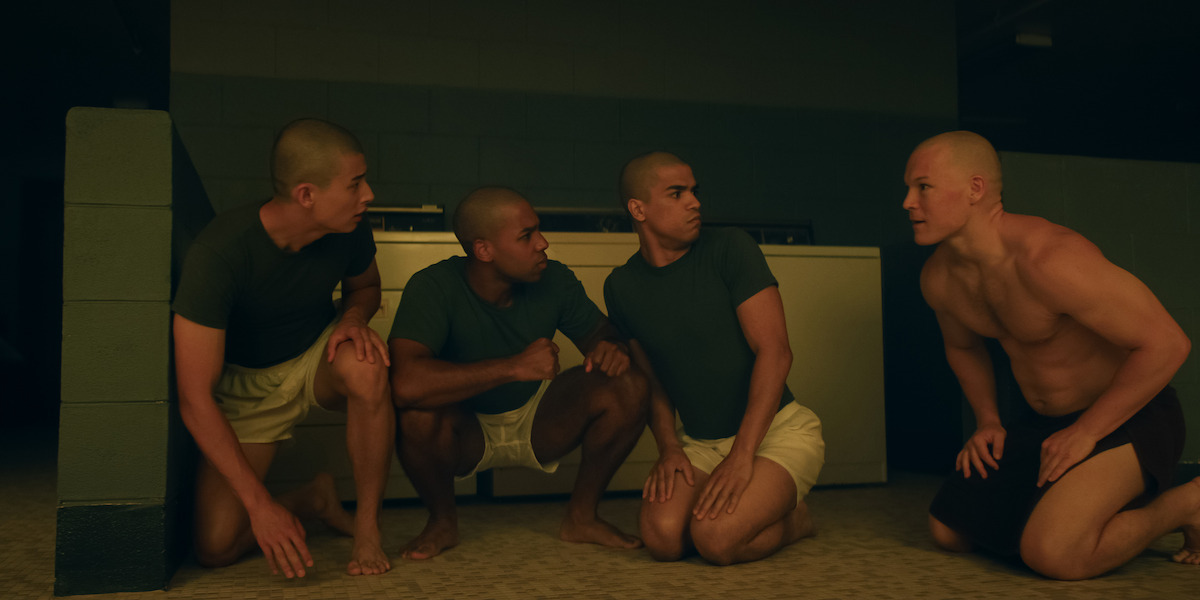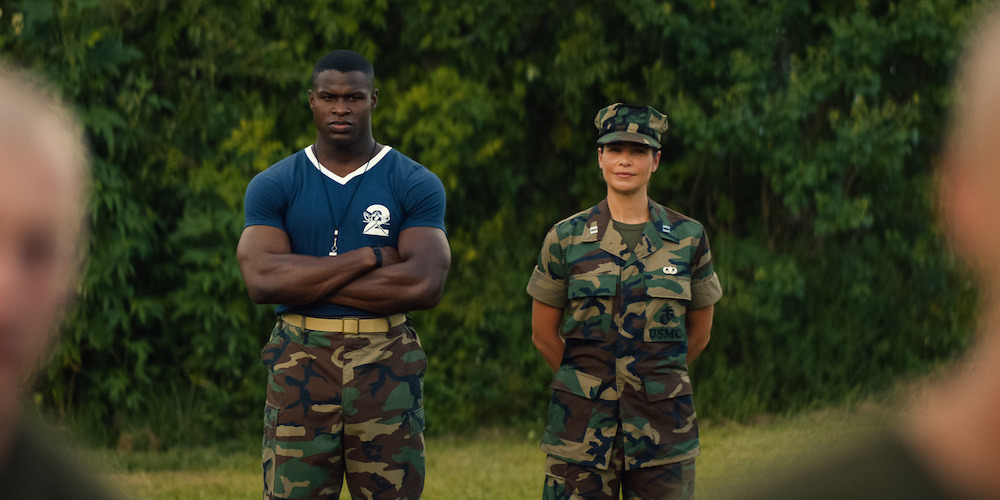The Netflix show ‘Boots,’ created by Andy Parker, is a military drama show that follows the unique story of a closeted teenager’s time in the Marine Corps, as explored through a comedic lens. In the 90s, 18-year-old Cameron Cope has no idea where his life is headed. Therefore, he decides to follow his best friend, Ray, and join the Marine Corps despite its discriminatory policy toward homosexuality. However, once he arrives at the boot camp and joins his platoon, 2032, he realizes just how ill-informed his choice might have been.
Surrounded by a diverse group of recruits who all have skeletons to hide in their own closets, Cameron slowly begins to learn the cost and reward of becoming a Marine. Employing a humorous tone, the series delves into the everyday realities of military boot camp, particularly for recruits like Cameron, who have been compelled to conceal a part of themselves for one reason or another. Therefore, given the authentic relatability of the story, it’s no surprise that it finds some tangible basis in reality.
Boots is Partially Inspired by Greg Cope White’s Memoir
‘Boots’ charts a narrative that remains rooted in reality, at least in part. The series draws inspiration from ‘The Pink Marine,’ the biographical memoir of Greg Cope White, a former US Marine-turned-writer and TV producer. The author enlisted in the US Army in 1979, during a time when homosexuality was illegal in the military. While closeted, he served as a communication specialist and even earned the rank of Sergeant and an honorable discharge. After six years of service, he began pursuing a career in Film and TV writing and production. Cope White came out in the early 1980s, initially within private circles and eventually more publicly. Yet, it wasn’t until 2016 that he decided to pen the truth of his experiences as a closeted gay Marine living through an era of overt intolerance.

After working as a TV writer for some time, Cope White was motivated to tell his own life story through the pen of an author. However, reportedly, he was also stirred into publishing his work as a response to stories about young teenagers who were driven to extreme measures as a result of vigorous bullying. As the story goes, the author wanted to write something that would inspire feelings of resilience and hope in the readers. Eventually, the book was picked up for an on-screen adaptation, following substantial roadblocks. It was decided that ‘Boots,’ the series, will only mine some inspiration from its source material and create a fictional counterpart for the author’s real-life experiences. Even so, Cope White was adamant about maintaining foundational connections to certain parts of his work.
Notably, one of these included the prominent significance that friendships played in his journey. As a result, the relationship between Cope White and his straight best friend, Dale, who enlisted alongside the author on the buddy system, is mirrored in the series through the dynamic between Cameron and Ray. Additionally, the former Marine was also adamant about showcasing the transformative role of the Marin in his life through the narrative of his fictionalized counterpart, Cameron. Ultimately, these same aspects remain woven into the fabric of the show, partly thanks to Cope White himself, who serves as a screenwriter and co-executive producer. Consequently, by retaining a real-life source of inspiration, this partially fictional story manages to hold onto a visible sense of realism.
Creator Andy Parker Could Relate to the Story Due to His Near-Miss Marine Enlistment
Similar to Greg Cope White, the creator of the source material, the show’s creator and show-runner, Andy Parker, also has a personal connection with the story and its lead protagonist. Although he was never an actual Marine, there was a time in his late teenage years when he almost enlisted in the military. Reportedly, in the late 1990s, a Marine Corps recruiter visited Parker’s house as the latter attempted to sell his parents on the idea. Although his folks weren’t against the idea, so much as confused by it, he ended up never enlisting. In a conversation with Rolling Stone, the show’s creator spoke about this experience.

Parker shared, “(Yeah,) I wanted to make sure nobody would know I was gay, and actively sought out the Marine Corps in particular. What better way to prove your masculinity than to join the Marines? That is the institution in our culture that gives you that stamp, the approval that says you are now a man. I was wooed by their amazing advertising — specifically that famous 1990 chess commercial, which I got to use in the pilot. To this day, I think it’s so funny because that ad is so gay.” Naturally, when Parker read Cope White’s ‘The Pink Marine’ memoir, it presented a “road not taken” narrative to him, which he was eager to adapt when presented with the opportunity. Ultimately, the creator’s personal experiences lent authenticity to Cameron’s story, particularly in relation to the 1990s era in which the series is set.
Boots Strives For Accurate Marine Representation Without Being Polemic or Propaganda
Given the premise of the story, ‘Boots’ remains intimately tied to its militaristic background, presenting a relevant influence on both the narrative and the characters’ development. For the same reason, Parker and his room of writers were intentional about maintaining ties to reality through expert consultation. The presence of Marine veterans, Nick Jones Jr. and Megan Ferrell Burke, on the ream of screenwriters certainly helped in this matter. Furthermore, Parker also employed the help of other Marine veterans, military advisers, and consultants for the show. Yet, these measures were only taken to ensure authenticity. He was very intentional about ensuring that the project didn’t become a propaganda piece with overtly pro-Marine or pro-military themes.

At the same time, Parker didn’t want to peddle anti-military sentiments. Instead, he only remained interested in presenting a realistic, grounded, and accurate interpretation of a real queer Marine’s experiences as a recruit during a time when enlistment came at the cost of their own visible identity. The creator elaborated on this in a New York Times interview, where he said, “Without becoming a polemic,” I think what we’re trying to do is shine a real light on the personal cost of these policies. We get to see what it does psychologically, spiritually, emotionally to people who have to distort themselves or lie or put themselves away or be shunned from an organization that they love and a country that they want to serve.”


You must be logged in to post a comment.